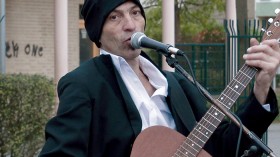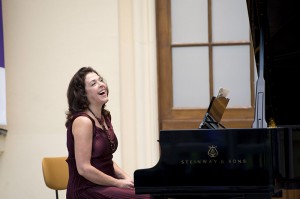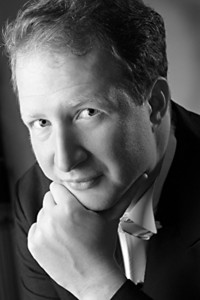It always goes by so quickly: it feels as if the third round just started, of the art vending machine in the Jewish Museum Berlin’s permanent exhibition. But in fact it’s almost finished and sold out – 2,600 items since April! That’s certainly enough reason to pop by to visit Howard Katz and ask him some questions, especially considering that he was the first of the now 22 artists we’ve featured to use music…

Howard Katz © Yoann Trillu
Dagmar Ganßloser: Howard, you work as an artist in many different genres. You’re a dancer, performer, and choreographer, but you’re also an active visual artist, and on top of that a singer-songwriter. Right now the art vending machine has your “Mix Tape” as well as “4 short films”. How did you choose those?
Howard Katz: It was clear to me from the start that I wanted to present my music in the art vending machine. The 17 songs on “Mix Tape” came into being over the last twenty years plus and – the same as “4 short films” – they’re mainly about experiences I’ve had since I’ve lived in Berlin, so since the mid-1990s. The production was uncomplicated and I made the selection intuitively, from the heart. I made the four videos for my songs completely on my own, with my telephone – it was an opportunity to try out something new. → continue reading
The last few weeks have been full of hectic hustle and bustle, with boxes being passed from hand to hand, examined, unpacked, and sorted through. Such a variety of objects emerged from their cases and seemed to be disseminating in every direction through the museum.

© Jewish Museum Berlin, photo: Gelia Eisert
Blue prints were spread out over a long, dark red sheet. Words seemed to glow in them – was it “tekhelet” or “argaman” or both? And what do they mean anyway?

© Jewish Museum Berlin, photo: Gelia Eisert
A “magic” card appeared in a kitchenette. Suddenly everything was kosher: the sink, the refrigerator, the dishes, the whole kitchen. The artist promised it would be, and thus it happened. → continue reading
An Interview with Elena Bashkirova
From 7 to 11 May, we will host a chamber music festival in the museum’s Glass Courtyard. Katharina Schmidt-Narischkin and Sylvia Winkler of our press office spoke in advance with the festival’s director Elena Bashkirova.
Press office JMB: As festival director, what themes have you chosen to emphasize this year?

Elena Bashkirova, festival director and pianist
© Monika Rittershaus
Elena Bashkirova: Our themes have been determined this year by two anniversaries: on the one hand, the start of the First World War 100 years ago and its impact on music; on the other hand, the 150th birthday of Richard Strauss. Both anniversaries augur a varied program for “intonations”: 1914 saw an astonishing richness of musical styles, which our concerts will reflect. And Strauss composed chamber music nearly his entire life, so I have a wide range of pieces and genres to choose from.
Every year at “intonations,” chamber music classics can be heard together with unknown works. What composers should visitors expect to discover in this third season?

David Robert Coleman, composer and conductor © private
Rudi Stephan was an extraordinary discovery for me. I heard Music for Orchestra and Violin a few years ago here in Berlin. I was impressed and deeply touched by it. As I was putting together the programs for “intonations,” I found his gorgeous chamber music and was delighted to have the chance to present it here with my colleagues. Rudi Stephan died in the war when he was 28. Given his talent, he would otherwise have certainly provided us with more outstanding music.
There will also be another world premiere: the fourth concert, on Saturday 10 May, will open with David Coleman’s “Three pieces for clarinet and piano.” Another significant composer this year will be Karol Szymanowski. He has his own tonal language, writing hauntingly beautiful music that unfortunately is played much too seldom. → continue reading




